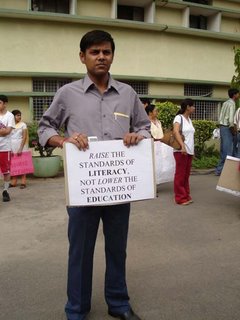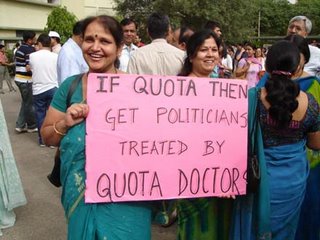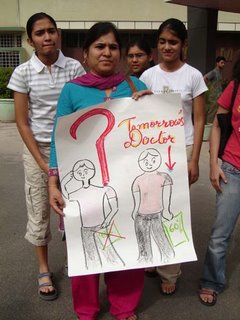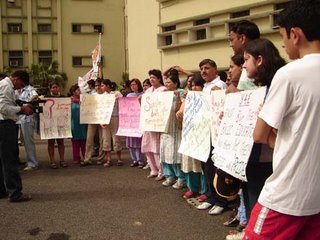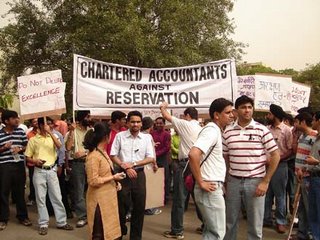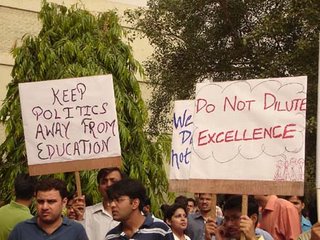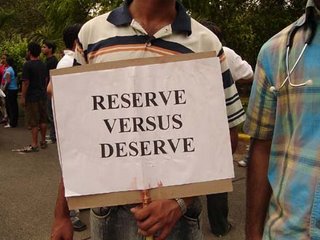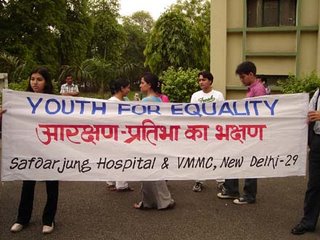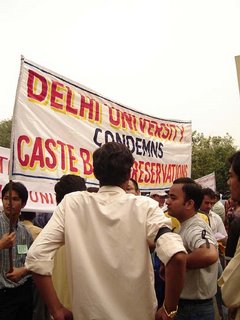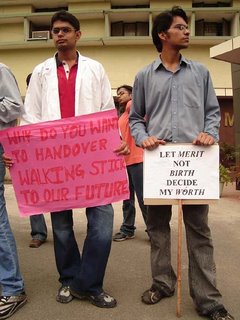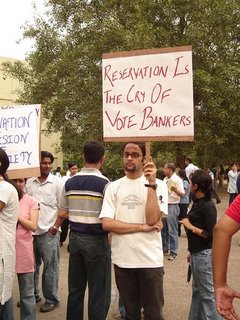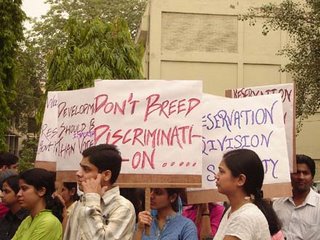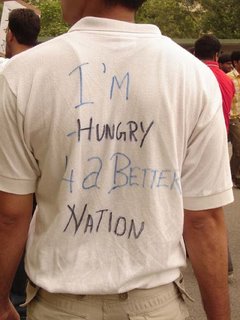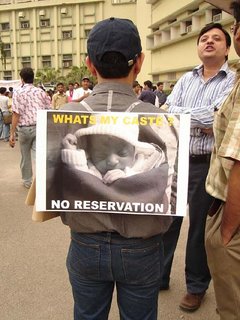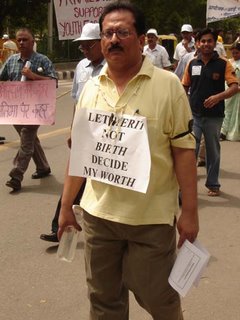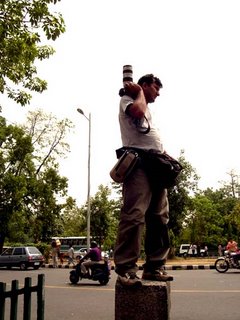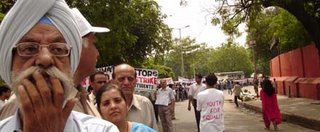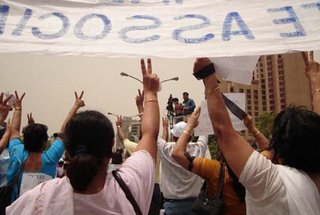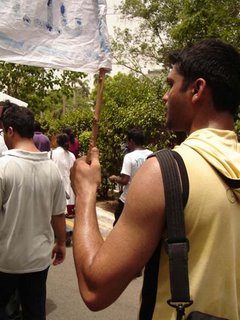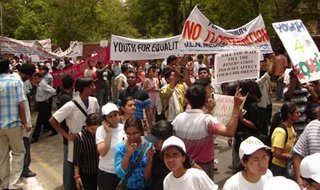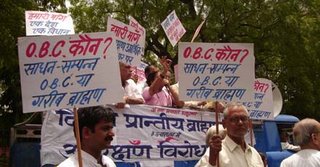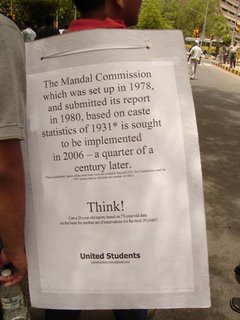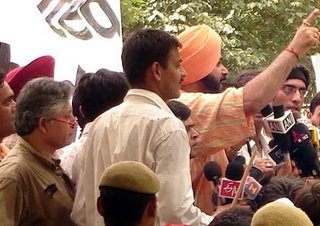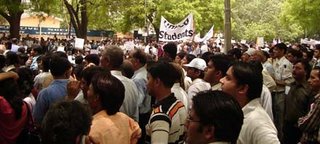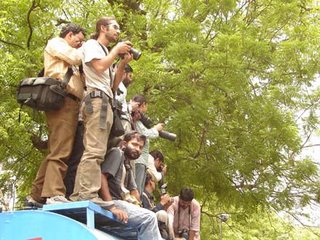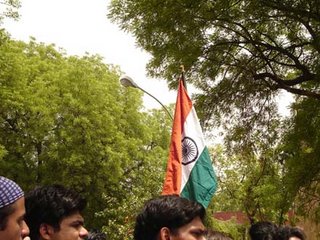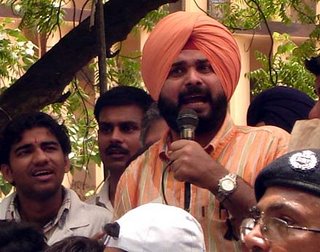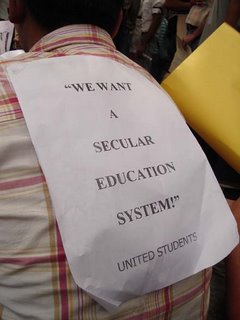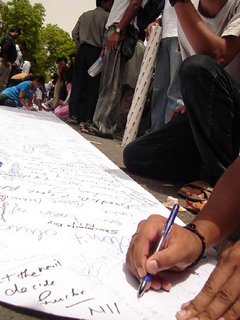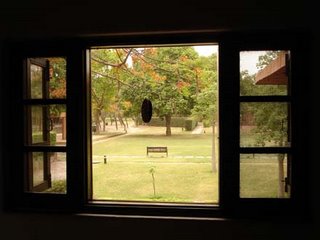Making Sense of Mr. Mehta
Vinod Mehta accuses the Indian India's 'smug, selfish, self-centered, satiated middle class, fattened on the fruits of the booming economy' of keeping their "Eyes. Ears and Minds Closed." Beginning with a disclaimer that the intention was not to defend Arjun Singh nor the new quota regime, but ends up doing precisely the 'unintended.'
Mr. Mehta and almost all of the pro-reservation brigade fail comprehend the Indian middle class' (which they for their ease of argument will always prefer to be identified as exclusively upper-caste) ire against reservation. Their hackneyed response is that the upper castes do not want to give up their 'stranglehold' on higher education and well paying jobs and therefore they protest.
Though I may not be in sync with the beliefs of all the anti-reservation protestors around the country, but I don't think that any of them are against the idea of 'affirmative action' to use the US terminology or 'positive discrimination' as the Brits say it. The anger is directed against the flawed policy of reservations which this country has been practicing unsuccessfully for the last 60 years. 60 years is a long time.
Coming back to Mr. Mehta, he is under the assumption that the current reservation policy is a poverty alleviation scheme. It is nothing but a vote-amassing activity continued shamelessly by successive governments lacking in the ability to do something more proactive to bring the downtrodden to the mainstream. Better educational facilities at the primary and the secondary levels would reap more benefits which no reservation policy can even dream of. Moreover Outlook's Editor-in-Chief would like us to believe that all 900 million of India's poor can be fitted into the three brackets of SC, ST and OBC. The so called forward castes are non-poor by merit of their caste.
Mr. Mehta threatens that in absence of reservation the poor would take the red road. Will the present reservation policy eliminate poverty? What use is reservation to people without access to even basic education? The rising literacy rate is a hoax, it doesn't translate to employability. We first need to ensure that.
Going into a self-contradictory mode, the master of Editor - the four-legged tail wagging sensible creature - with reference to a previous cover story of the magazine asserts that affirmative action in the form of reservation will do as much good in India as it did in the United States. What Mr. Mehta forgets, and I quote from the same cover story that he was referring to:
Prof Gary Orfield, director of the Civil Rights Project at Harvard University, explains, "Our Supreme Court outlawed quotas. So we have no seats set aside for any racial group. This is a fundamental difference between the American and Indian AA system".
That is a big difference. The politics of percentage does more harm than all the promised good. The article further states
... Weisskopf says, reservation of 50 per cent "for formally less qualified but potentially successful AA beneficiaries could result in the inclusion of those who do not really have the potential to succeed".
High percentage of reservation could also invite backlash - and erode AA. Weisskopf explains, "A high percentage of reservation will lead to a much higher degree of resentment among non-beneficiaries about the unfairness of process, which - even when not justified - can undermine the efforts to integrate marginalised groups into society."
Exemplifying 49.5 to 69.5 percent reservations in the Southern states, Mr. Mehta asks, "Are we to assume that engineers, doctors, MBAs from these southern states are substandard?" The answer, Sir, is available in the lists that you and your rival publications attempt to aggregate every year. Most institutes from southern India which make it to the top do not practice reservation policy to the extent that you mentioned and for those who do, please check where they stand in your ratings?
Please do not confuse anti-reservation with anti-affirmative action. Reservation is one of the worse practices of affirmative action and even in the land of affirmative action this practice had been abolished as unconstitutional. There are better ways.

















